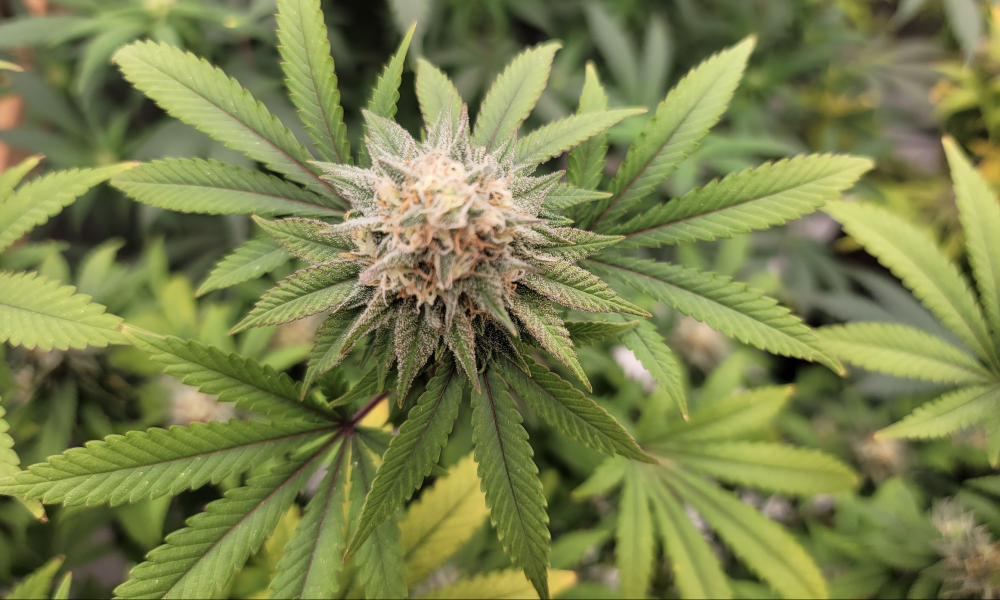A Delaware House committee on Tuesday approved a bill to legalize marijuana for a second time following a procedural mishap that inadvertently prevented public testimony on the proposal at an earlier meeting.
Rep. Ed Osienski (D) is sponsoring the legislation to simply legalize cannabis possession and gifting, as well as a companion bill that would create a regulatory framework for the market. The two-track approach to reform is the sponsor’s response to the House defeating a prior measure in March that included both components.
The idea is to get the basic legalization bill through the chamber with a simple majority, thereby putting pressure on lawmakers to support the separate proposal that requires a 3/5th supermajority, rather than leave the market unregulated. Key legislators have signaled that the bifurcated approach might work, even if they don’t support legalization.
But because of a procedural issue last month—with the chair of the House Health & Human Services Committee approving a motion to vote on the simple legalization bill HB 371 before the public had a chance to testify—the timeline was pushed back.
The panel reconvened on Tuesday to get that public feedback, hearing from numerous witnesses before voting once more to advance the measure. The panel didn’t initially have enough support from members present at the meeting for passage, but lawmakers were given time throughout the day to record their votes, and a majority eventually signed on.
“This bill ends over 50 years of prohibition and criminalization in Delaware,” Osienski told fellow lawmakers at Tuesday’s hearing.
Several pro-legalization activists testified in favor of the reform proposal, while representatives of the administration of Gov. John Carney (D) and the Medical Society of Delaware spoke in opposition.
Meanwhile, the House Revenue & Finance Committee passed the separate marijuana regulation bill last month and sent it to the Appropriations Committee for consideration before it potentially moves to the floor. A hearing in that panel has not yet been scheduled.
—
Marijuana Moment is already tracking more than 1,000 cannabis, psychedelics and drug policy bills in state legislatures and Congress this year. Patreon supporters pledging at least $25/month get access to our interactive maps, charts and hearing calendar so they don’t miss any developments.![]()
Learn more about our marijuana bill tracker and become a supporter on Patreon to get access.
—
Vermont lawmakers followed a similar approach to what Osienski is now pursuing by first passing a noncommercial legalization bill in 2018 and then following that up with separate legislation to tax and regulate sales in 2020.
Here’s what Delaware’s HB 371 would do:
The bill would amend state statute by eliminating penalties associated with the possession of up to one ounce of marijuana by adults 21 and older.
It would further add a section stipulating that adults 21 and older could share up to an ounce of cannabis “without remuneration.”
That section clarifies that marijuana could not be “gifted” as part of a contemporaneous “reciprocal transition” or if the gift is contingent on a separate transaction for non-cannabis products or services.
Here are the main provisions of the complementary HB 372:
A marijuana commissioner would be appointed under the state Division of Alcohol and Tobacco Enforcement. The official would be tasked with regulating the industry and overseeing licensing of retailers, cultivators, manufacturers and laboratories.
Licenses would be granted through a scored, competitive process, with advantages given to those who pay workers a living wage, provide health insurance or meet certain other benchmarks.
After 19 months of the bill’s enactment, regulators would need to approve 30 retailer licenses, half of which would go to social equity applicants. Social equity applicants would be defined as entities majority-owned by people with past cannabis convictions or who live in an area disproportionately impacted by the drug war.
Those applicants would also be allotted one-third of the planned 60 cultivation licenses, one-third of manufacturing licenses and two of five licenses for testing laboratories. They would also qualify for reduced application and licensing fees as well as technical assistance from the state.
Retail marijuana sales would be subject to a 15 percent tax. No tax would be levied on medical cannabis sales.
Seven percent of the tax revenue would be used to support a new Justice Reinvestment Fund that would provide grants, services and other initiatives that focus on issues such as jail diversion, workforce development and technical assistance for people in communities that are economically disadvantaged and disproportionately impacted by the drug war. The money would also be used to help facilitate expungements.
Home cultivation for personal use would continue to be prohibited.
The legislation would allow individual municipalities to establish their own regulations for marijuana business operating times and locations, and they would also be allowed to ban cannabis companies altogether from their jurisdictions.
The bill provides explicit legal protections for state employees who work with the state-legal market. And it would also allow marijuana businesses to claim tax deductions at the state level—something they’re prohibited from doing at the federal level under a tax code known as 280E.
The tax-and-regulate bill is materially the same as the measure defeated in the state House last month.
Notably, House Speaker Pete Schwartzkopf (D), who was the sole Democrat in the House who voted against the earlier legalization bill, signaled that he might be inclined to support a bill providing a regulatory infrastructure for marijuana commerce if the chamber votes to legalize possession and sharing. That said, he still intends to vote against HB 371.
An even earlier legalization bill from Osienski cleared committee last year. However, disagreements over social equity provisions stalled that version, keeping it from the floor. At the time, Osienski pledged to bring a revised bill for the 2022 session that could earn broad enough support to pass.
When the sponsor’s earlier bill was being considered last year, he said he was caught off guard when he was informed that the inclusion of a social equity fund meant the bill would require 75 percent of legislators in the chamber to approve it.
The lawmaker tried to address the problem through an amendment, but some members of the Black Caucus opposed the changes, and the measure failed.
Osienski has worked with the Black Caucus in the ensuing months to build support and move toward more passable legislation. And a clear sign of the progress is that Reps. Rae Moore (D) and Nnamdi Chukwuocha (D) signed on as cosponsors to the since-rejected bill after pulling their support for the 2021 version over equity concerns. They’re also listed as cosponsors for the new HB 372.
In 2019, Osienski was the chief sponsor of a legalization bill that cleared a House committee but did not advance through the full chamber. That bill would have allowed medical cannabis dispensaries to begin selling marijuana to adults 21 and older while the rest of the adult-use industry was still preparing to launch, a provision that was removed from later versions.
Four of the state’s six medical marijuana companies came out publicly against that change and testified in opposition to last year’s bill. In response, Delaware activists mounted a boycott against those operators.
Portions of the most recent version of the cannabis regulations bills on expungements were removed this session, as they were made redundant by the enactment of separate legislation last year.
As supportive lawmakers have worked to push cannabis reform through the legislature, they also faced the challenge of winning over Carney, one of the rare Democratic governors who remain opposed to legalization.
Despite his wariness about adult-use legalization, Carney did previously sign two pieces of marijuana expungement legislation. In 2017 and 2018, a state task force met to discuss issues related to legalization, and the governor hosted a series of roundtable meetings about cannabis.
A legalization bill previously received majority support on the House floor in 2018, but it failed to receive the supermajority needed to pass.
Carney’s predecessor approved a measure to decriminalize simple possession of cannabis in 2015.
An analysis from State Auditor Kathy McGuiness (D) released last year found that Delaware could generate upwards of $43 million annually in revenue from regulating marijuana and imposing a 20 percent excise tax. The legal market could also create more than 1,000 new jobs over five years if the policy is enacted, according to the report.
Photo courtesy of Mike Latimer.
Medical Disclaimer:
The information provided in these blog posts is intended for general informational and educational purposes only. It is not a substitute for professional medical advice, diagnosis, or treatment. Always seek the advice of your physician or other qualified healthcare provider with any questions you may have regarding a medical condition. The use of any information provided in these blog posts is solely at your own risk. The authors and the website do not recommend or endorse any specific products, treatments, or procedures mentioned. Reliance on any information in these blog posts is solely at your own discretion.







